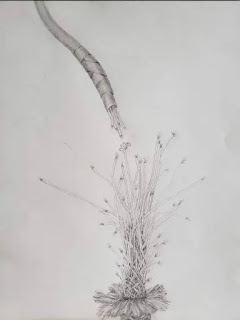Neuroception & Sobriety
A Neuroception Poem
In the realm of self-discovery, there stood a man,
His journey through darkness, a testament to withstand. With resolve and introspection, he found a guiding light, Harnessing neuroception, he embarked on a noble fight.
In the depths of addiction, his spirit was confined,
Chained by cravings and temptations that bound his mind. But he sought a higher truth, a path to liberation,
And within the whispers of his body, he found revelation.
With practiced awareness, he honed his senses keen,
Attuning to the subtleties that lay unseen.
The tremor of his heartbeat, the tension in his brow,
Neuroception unlocked the answers he sought now.
In moments of vulnerability, triggers would arise,
Yet he embraced the power within, to quiet the cries.
He gazed upon the triggers with eyes full of grace,
Acknowledging their presence, he embraced each sacred space.
Through introspection, he deciphered their true core,
Emotions intertwined, demanding resolution and more. He confronted the pain, the fears that held him down, And with wisdom and courage, he turned his life around.
With neuroception as his compass, he navigated the storm, Tempestuous seas of temptation, he did transform. Each craving met with understanding and care, A symphony of self-compassion, a melody so rare.
He painted new landscapes, rewriting the story,
Redefined his relationship with both sorrow and glory.
Embracing the rawness, he danced with vulnerability,
And in each moment’s presence, he discovered tranquility.
No longer a prisoner to the demons of his past,
He emerged from the ashes, a spirit that would last.
His sobriety not just a triumph, but a testament of his might, For he wielded neuroception as a beacon of guiding light.
In the tapestry of his life, a new chapter was unfurled,
With neuroception as his ally, he reshaped his world.
He inspired others, sharing wisdom from within,
A living testament to the strength of the human kin.
So, let his tale be a reminder, a beacon in the night,
That within us lies a power, a gift shining bright.
Embrace the gift of neuroception, let it guide your way,
And reclaim your sobriety, in the light of a brand-new day.

What is Neuroception?
Neuroception is like a built-in superpower that our brains have. It’s the ability to pick up on subtle signals from our surroundings without us even realizing it. These signals can tell us if we’re in a safe or dangerous situation, or if things are a bit unclear.
Neuroception is useful in your life, especially in your recovery, because it helps you understand and respond to what’s happening in your body and mind. It can help you recognize the things that trigger your addictive behaviors or cravings. By being aware of these triggers, you can take control and make better choices to avoid falling back into old habits.
Another way neuroception is helpful is in managing your emotions. It lets you tune into how your body feels when you’re experiencing different emotions. So, when you start feeling overwhelmed or upset, you can use that awareness to calm yourself down and find healthier ways to deal with those emotions.
Neuroception also helps you reflect on yourself and gain insights into why you think, feel, and behave the way you do. It allows you to understand your patterns and triggers better, so you can make conscious decisions that support your recovery.
Additionally, it helps you create safe and supportive environments. By paying attention to the cues around you, like the people you’re with or the places you’re in, you can determine if they are helping or hindering your recovery. This way, you can surround yourself with positive influences and set yourself up for success.
Ultimately, using neuroception means harnessing your brain’s power to understand yourself, regulate your emotions, build healthy relationships, and make choices that align with your goals and values. It’s like having an extra tool to navigate the challenges you face in high school and beyond, and it can contribute to your overall well-being and success.
How does Neuroception benefit us?
1. Trigger Recognition: Neuroception helps you notice subtle cues in your environment, such as certain places, people, or situations that may trigger your addictive behaviors or cravings. By being aware of these triggers, you can develop strategies to avoid or cope with them, reducing the likelihood of relapse.
2. Emotional Regulation: Neuroception allows you to sense changes in your physiological state that accompany different emotions. It helps you recognize when you’re feeling overwhelmed, anxious, or stressed. By being aware of these bodily signals, you can intervene with coping techniques like deep breathing, mindfulness, or seeking support to regulate your emotions effectively.
3. Self-Reflection and Insight: Neuroception helps you gain insights into the underlying causes of your thoughts, emotions, and behaviors. By paying attention to your bodily responses, you can better understand your triggers, patterns, and the reasons behind your actions. This self-awareness empowers you to make conscious decisions and develop strategies that support your recovery.
4. Safe Environment Creation: Neuroception allows you to assess your environment and relationships for cues of safety or danger. By tuning into subtle signals, you can determine which settings or people are supportive and nurturing for your recovery. This awareness enables you to create a safe and positive environment that promotes your well-being.
5. Resilience Building: Neuroception helps you accurately perceive threats versus perceived dangers. It allows you to differentiate between real risks and situations that trigger fear or anxiety based on past experiences. This discernment enhances your resilience, enabling you to respond with adaptability and problem-solving skills, rather than being overwhelmed by unnecessary fear or stress.
6. Healthy Relationship Formation: Neuroception assists in developing healthy relationships by helping you sense cues of safety, trust, and connection. It allows you to intuitively gauge whether a person or environment feels supportive and genuine. By being attuned to these cues, you can engage in healthier relationships that contribute positively to your recovery journey.
In summary, neuroception provides a heightened awareness of your body’s signals and environmental cues, enabling you to recognize triggers, regulate emotions, gain self-insight, create a safe environment, build resilience, and establish healthier relationships. By utilizing this subconscious process, you can make more informed choices, respond effectively to challenges, and support your ongoing recovery.

Some specific ways you can utilize neuroception to help yourself in recovery:
1. Body Awareness: Pay close attention to the sensations in your body. Notice any tightness, restlessness, or discomfort. These physical cues can indicate emotional states or triggers that may impact your recovery journey.
2. Breath and Grounding: Use your breath as an anchor to stay present and grounded. Deep, intentional breathing can activate your parasympathetic nervous system, promoting relaxation and reducing stress. Practice grounding techniques, such as feeling the weight of your body on the ground, to enhance your sense of stability.
3. Recognize Triggers: Develop an awareness of your personal triggers for cravings or addictive behaviors. Observe the subtle cues in your environment, interactions, or internal thoughts that might precede these triggers. Identifying and understanding them can help you intercept and respond more effectively.
4. Emotional Regulation: Neuroception can assist in managing overwhelming emotions. When you notice a rise in emotional intensity, pause and acknowledge the feelings without judgment. Engage in self-soothing techniques like deep breathing, visualization, or seeking support to regulate and process your emotions in a healthier way.
5. Create Supportive Environments: Utilize neuroception to evaluate and shape your surroundings. Identify spaces and relationships that evoke feelings of safety, support, and positivity. Surrounding yourself with people who uplift and understand your journey can greatly aid in your recovery.
6. Self-Reflection and Mindfulness: Cultivate a practice of self-reflection and mindfulness. Regularly check in with yourself to assess your thoughts, emotions, and needs. Mindfulness allows you to observe without reacting, providing valuable insights into patterns and triggers that impact your recovery.
7. Positive Anchoring: Engage in activities that bring you joy, purpose, and a sense of fulfillment. These positive experiences can anchor you in the present moment, reinforcing positive neural pathways and reducing the likelihood of turning to addictive behaviors.
Tim Welch, LPCC Mental Health Counseling,
Newark, Ohio Licking County Online Therapy. Virtual Counseling for Alcohol Addiction, Drug Addiction, Anxiety, Depression & Mental Health Issues.


